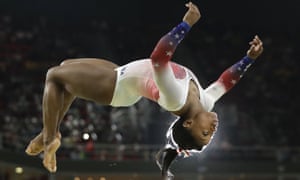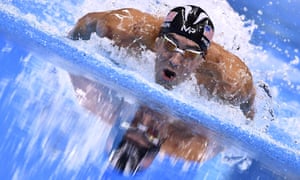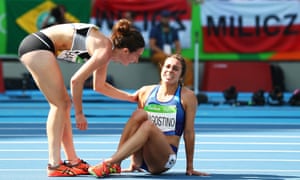On the seventh day of the Games, it seemed, for a brief, bewildering moment, as though a bomb had gone off in the Olympic Park. A thunderclap sounded around the aquatics stadium and echoed across the food court. No one fled. Instead everyone sped towards the scene. It turned out that Brazilian police had detonated a discarded rucksack – they later explained that it had contained a jacket and a pair of socks – and then opened the gates to the basketball arena, where Spain were about to play Nigeria. All those running people were just in a rush to take their seats. Otherwise, no one blinked because it was the third similar incident in a week. There had been another detonation during the men’s cycling road race and a third outside the Maracanã. That familiar phrase, “controlled explosion”, seems now to sum up the Rio Olympics.
If anything it implies that the authorities had more control than they really did. Brazil was in the midst of its worst recession since the Great Depression. In March the man who brought the Olympics to the city, the former president Lula Inácio da Silva, was arrested as part of the investigation into government corruption. In May, his successor Dilma Rousseff was suspended after the senate voted to start impeachment proceedings against her. Neither were welcome at the opening ceremony of the very Games they had arranged, and which was supposed to have been their legacy. Instead, the interim president, Michel Temer, was there. He took the precaution of arranging for the music to be turned up extra loud when he took to the stage. You could still hear the boos.

Earlier that same day hundreds of protestors gathered on the waterfront. They were cut off from the grand Copacabana Palace hotel, where the IOC’s mandarins had gathered, by a cordon of riot police, part of an army of 85,000 out on the streets. Many of them were working to try to suppress crime in the favelas, where residents found themselves under “a state of semi-siege”, with soldiers stationed at the ends of the streets and helicopters hovering overhead. They were more conspicuous than the mosquitoes, although many medical experts had suggested that the Games should be postponed because they feared the Zika virus would lead to a global health emergency.
The IOC had a crisis of their own. In July, the World Anti-Doping Agency published the first part of the independent McLaren report into Russian doping. The IAAF had already suspended Russian track and field athletes from competing in the Games. Now McLaren announced it was “beyond a reasonable doubt” that Russia had organised systematic cheating at the Sochi Winter Olympics. Wada recommended that the Russians should be suspended from the Rio Games but the IOC fudged the decision and deferred it to the federations running individual sports. So it became a free-for-all and a busy time for lawyers travelling back-and-forth at the court of arbitration for sport.
An uneasy atmosphere settled over Rio. The Russian athletes were indignant, many of the rest incensed. Everyone was leery, even paranoid. No one knew what they could believe. At the swimming pool, the Russian competitors were booed and bad-mouthed. Yulia Efimova, who had repeatedly tested positive for banned substances in the past, was singled out and, she said, made a scapegoat in a new “cold war”. At the athletics track, the first question every record breaker faced was a variation on “why should we believe you’re clean?”
In the first few days the Games seemed to teeter, almost topple, into utter chaos. The athletes’ village was unfinished, all leaky pipes, faulty locks and unlit stairwells. Protestors targeted the Olympic torch relay, which had to be diverted. A kayaker capsized after hitting a sofa floating in the water at Lagoa. A wayward bullet hit the media tent at the equestrian centre. Two bad crashes on the road race course left Annemiek van Vleuten and Vincenzo Nibali in hospital. There was feverish talk of robberies, photographers who refused to use taxis because they had been warned they were being targeted by criminals – but soon enough everyone grew accustomed to the crazy rhythm of things. Another bullet was found, a bus was attacked, the water in the diving pool turned bright green, Ryan Lochte shot a guerilla version of The Hangover IV: Blame It On Rio. The Games swept on.

Because, in among all this, there was a lot of brilliant sport. Michael Phelps became the most successful Olympian of this, that and every other era, and never looked more of a champion than he did when he lost to a 21-year-old kid from Singapore. Simone Biles bewitched the world, won four golds and one solitary bronze after she slipped on the balance beam. Fiji’s rugby sevens team bewildered everyone and won their country’s very first gold medal. Usain Bolt beat all-comers, again, but still found himself sharing the stage with his young friend Wayde van Niekerk, who shattered the 400m world record. Caster Semenya eased to victory in the 800m and then refused to be hostage to the press’s questions. The British had their best Olympics in a century.
The Brazilians turned out for their own. Rafaela Silva, a 24-year-old from the City of God, won gold in the women’s judo. Thiago Braz da Silva beat the great Renaud Lavillenie in a late-night pole vault duel, one-on-one at the Olympic stadium. Alison Cerutti and Bruno Schmidt lit up the beach volleyball arena, the one stadium that was guaranteed to be packed every night of the Games. And back at the Maracanã the Brazilian football team achieved some measure of redemption for the calamities of their World Cup by beating Germany on penalties, the winning kick taken by – who else? – Neymar.

But the Games are always about more than who wins what. There were 11,544 athletes competing in Rio – and every one with a story worth telling. Pita Taufatofua became a heartthrob after carrying the Tongan flag. Two Korean gymnasts, Hong Un-jong and Lee Eun-ju, posed for a cross-border selfie. The USA’s Ibtihaj Muhammad spoke out about how it felt to be an American Muslim in the time of Trump. Egypt’s Islam El Shehaby was sent home because he refused to shake the hand of an Israeli opponent. The Irish boxer Michael Conlan flicked his fingers at his judges, Tserenbaatar Tsogbayar and Byambarinchen Bayaraa stripped down to their underpants in protest at theirs. The Chinese diver Qin Kai dropped to one knee to propose to his team-mate He Zi on the medal podium. New Zealand’s Nikki Hamblin and the USA’s Abbey D’Agostino helped each other after a collision in the heats of the 5,000m.
However, the enduring image will be that shot of Bolt sporting his cartoon grin, striding out ahead of the field in the 100m semi-finals, a road runner trailing so many Wile E Coyotes. Around him, everything is a blur. Which works because the Rio Games were a whirl, a kaleidoscopic fortnight of sport that left everyone dizzy. All human life was there, for better, for worse, in victory and defeat, chaotic, corrupt, endearing, enraging, inspiring.



